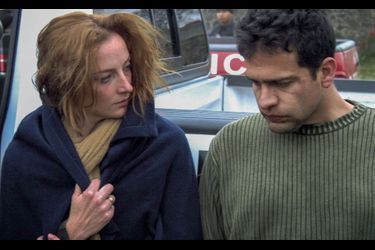Ten years after her 2603 days in prison in Mexico, she is a survivor struggling to find her place in her own country. We met her exclusively.
Florence Cassez has not really changed. Neither his bursting, frank laugh, nor his clear, sparkling and sensitive gaze. At almost 48 years old, she exudes a powerful vital force that adds to her natural elegance. On the beach at Dunkirk where we find her on a Thursday in July, Florence is friendly while keeping her distance: she has learned to be wary. The face is luminous, but the body, a little stiff, suggests his anxiety. Almost ten years after her release, Florence Cassez is still rebuilding, always. She would never have imagined that the return to life would be so slow, painful, violent. Freedom has a surprisingly harsh taste.
Read also: “7 years in prison mark for life” – Florence Cassez. A complaint to rebuild
The fate of this young Frenchwoman changed on December 9, 2005. That day, then 31 years old and living in Mexico for two years, she was arrested with her Mexican ex-boyfriend, Israel Vallarta, on the ranch of this last, during a spectacular police operation in front of television cameras. Three hostages, including an 11-year-old child, are freed. Florence and Israel are suspected of being the masterminds of the Zodiacs kidnapping gang, accused of kidnapping, forcible confinement, organized crime and possession of firearms and ammunition for the exclusive use of the armed forces… Florence cries out at the machination politician, proclaims his innocence. Nothing works. She will be sentenced to ninety-six years in prison at first instance, sixty years on appeal. The Florence Cassez affair caused a stir, upsetting diplomatic relations between Mexico and France.
For seven years, Florence, permanently on the alert, survives the hell of Mexican jails. “The day, she told us in November 2009 when we went to visit her, I take care. I have visitors, I sell my necklaces, I paint, I read, I wash the stairs in the dormitory, I prepare the sheets for the films I show at the DVD club. Three times a day, you also have to report to the guards: at 8:30 a.m., at 2 or 5 p.m., depending on the day of the visit, and at 7:30 p.m., to show that you are present and above all alive. There is a lot of violence, a lot of drugs: marijuana, weed, crack…”
Florence Cassez on the cover of number 3121 of Paris Match, in March 2009. She has just been sentenced on appeal by a Mexican court to sixty years in prison
© DR
Within these walls, Florence wavers but never loses hope, deploying mad energy and immense courage to defend herself against the accusations of the Mexican government. On January 23, 2013, his nightmare ends. The Supreme Court of Mexico recognizes implicitly that its file is empty, that the evidence is refutable. His fundamental rights have been violated, his “immediate and absolute” release is voted. After 2603 days spent behind bars, Florence hastily leaves the country, boarding a plane, heading for France; we are on board. Glass of champagne in hand, she clinks glasses with her father, her lawyer, Frank Berton, and the crew, before falling asleep curled up, without even taking off her shoes.
The awakening is brutal. The 30-year-old must relearn “the outside, its aggressions and its possibilities”, as Philippe Besson describes it in his novel “A moment of abandonment”, which relates the return to his village of a man released from prison. Florence was not ready to live this extraordinary destiny, but extricating herself from it is even more difficult. “With hindsight, I realize the violence of this sudden liberation, she confides to us today. I endured everything, suffered everything like a nice little soldier. I was happy to be free and, at the same time, I was frustrated by this discrepancy between what I felt and reality.

Behind bars in Santa Marta prison during his trial in January 2008.
© R. Schemidt/AFP
Upon his arrival, Foreign Minister Laurent Fabius rolls out the red carpet for him; but the French administration has removed it from its registers. The citizen no longer exists. Her life froze seven years earlier, when she was the manager of a major retailer. Florence Cassez finds herself without work, without the right to unemployment, without a bank card or Vitale card; universal health coverage (CMU) as the only safety net. It is thus amputated that she apprehends her new existence, the latest technologies, the crowd, the suspicious looks, the infinite space; an accelerated life, as if time were counted for him. Fifteen days after her return, she moved to Annecy with her companion, Fausto Avila, a Mexican refugee in France for ten years. Six months later, she gets married. In February 2015 his daughter, Fleur, was born. “The only thing I would keep if I had to start all over again,” she says with obvious sincerity.
The banality of everyday life scratches Florence raw. At first, she can’t even get out, terrified. “The cars, the noise, the shelves of a store where I couldn’t choose a toothpaste, like the menus at the restaurant… I was panicked,” she recalls. Florence is helpless. When he left, no one offered him psychological support; So, drowning her disarray in a fast-paced daily life, she wrote two books and made a documentary series on miscarriages of justice with her friend Mélissa Theuriau. Then she works as a reintegration counselor in an administrative organization, while raising Fleur. Dark-skinned, soft-eyed, ebony-black hair, “she’s a very sensitive, intelligent, mature little girl who is interested in everything,” describes her mother. Florence seems to have found a balance. The years pass, the difficulties catch up with her. Emptiness is worse than anything. In 2016, she divorced and returned to her parents, in her native North, in Dunkirk, by the water. A platinum blonde time, it would go almost unnoticed…

In 2005, during the arrest which will turn out to be staged, Florence and her ex-companion. Detained for seventeen years, Israel Vallarta has still not been tried.
© Courtesy of Netflix
Today, Florence is a single mother. “I have to support ourselves. Two years ago, in June 2020, Fleur lost her dad, ”she says without giving further details. The support of his family and loved ones is salutary; she writes every day to a former fellow Colombian prisoner who has become her friend. The detention, during which she fought “like a lioness”, increased her pugnacity tenfold. But her past, her anxieties haunt her nights with, lurking deep in her brain, the excruciating fear of being imprisoned again. Florence learns to live with her demons. “I’m never at peace,” she admits. I can’t leave my city, I’m unable to travel. I’m scared. But I fight every day to be well, to be positive, to overcome the difficulties by telling myself that the worst is behind me and by keeping in mind my priority: the well-being of my daughter, who is 7 years old and is entering CE1. . I’m getting there, helped by health professionals. I managed to buy my apartment with a large garden. I feel safe there with Fleur and our three cats. It is my haven of peace. I still have a lot of work to do, but at least I don’t feel angry anymore. I managed to detach myself from people’s opinion by ceasing to want to convince them of my innocence.
”
My only concern: the well-being of my daughter, Fleur, 7 years old
“
Almost seventeen years after her arrest, doubt is no longer allowed: the facts clear Florence Cassez of all responsibility. Several surveys have demonstrated this. From August 25, the documentary series “Designated Guilty. The Florence Cassez affair”, directed by the Mexican Gerardo Naranjo, is broadcast on the Netflix platform. It summarizes the scandal in five episodes. The director skilfully denounces the staging of the false arrest of Florence Cassez and Israel Vallarta, the torture of the brothers and nephews of the latter – supposed members of the Zodiacs, this gang invented from scratch by the Mexican authorities –, the forgeries testimonies, the inconsistencies of the eighteen volumes of the legal file and the unfailing support of Nicolas Sarkozy, then President of the Republic.
The executioners of Florence Cassez have since been dismissed from the government. Former supercop Genaro Garcia Luna, head of the Mexican Federal Police and behind the Frenchwoman’s incarceration, was arrested by the FBI in Dallas, Texas on December 9, 2019. US justice l accused of corruption and complicity with the Sinaloa drug cartel, led by “El Chapo”. His trial will begin in October when, in Mexico, Israel Vallarta is still awaiting his judgment, hoping for an early release. Florence testified in the documentary to have her say. After that, she will disappear. “Watching it, I put the nightmare of my own story into perspective, because Israel and its loved ones suffered terrible things that were spared me,” she says, almost ill at ease. “Today, she adds, I am happy with the little I have: my daughter, my apartment, my health. I long for a normal environment for Fleur. Baking, just being at our place. To regain anonymity and – why not? – get involved in helping others.”
“Designated guilty. The Florence Cassez affair”, by Gerardo Naranjo, a documentary co-produced by Canana, Atlantique Productions and Élodie Polo Ackermann of Imagissime (Mediawan Group).
